The BioCanteens Transfer Network is using the preparation of school meals with locally grown, organic food to protect people’s health and the environment. Project leaders aim to transfer good practices from Mouans-Sartoux, in France’s Provence-Alpes-Côte d’Azur region, to cities across Europe.
- 27 August 2020
The dynamic created in the network pushed the partner cities to adopt a global approach by including new aspects they weren't working on. BioCanteens created a dynamic which will hopefully continue in each of the cities, even after the project is completed.
Mouans-Sartoux, the project’s lead partner, has been able to reduce food waste in participating schools by around 80 %, from approximately 150 g to 30 g per plate. This compensates for the cost of switching to organic products. The accompanying educational activities raise children’s awareness of sustainable food.
In Troyan, Bulgaria, a municipal farm was built from scratch to provide canteens with local, organic produce. In Vaslui, Romania, social canteens have improved accessibility to high-quality meals for disadvantaged groups. Partner cities have improved their public procurement processes, developed educational activities for children and increased their share of organic products.
Wider vision
Using school canteens as a starting point, the project’s wider vision is to create a resilient, sustainable local food system. It aims to develop organic canteens, reduce food waste and reinforce both offer of and demand for organic products in partner cities in Belgium, Italy, Portugal, Bulgaria, Greece and Romania. The aim is to involve associations, producers, retailers, citizens and universities.
The good practices demonstrated in Mouans-Sartoux can be easily applied in partner cities and elsewhere to increase the quality of meals served and to facilitate kitchen management. They are implemented at various stages of the catering process.
These practices can be used to help kitchen staff devise alternative menus and adapt portion sizes during food planning and preparation. Coaching during mealtimes can help educate children and food waste can be sorted and measured after meals.
Bonds between partners
In January 2019, project leaders organised a three-day transnational meeting dedicated to good practices for project coordinators and school chefs. This involved a collective cooking session in one of Mouans-Sartoux’s school canteens, in which partners were placed into teams and cooked meals embodying partners’ local culture. This was followed by a shared dinner.
The purpose was to create bonds during a fun exchange between professionals and to demonstrate the importance of actively involving kitchen staff if the initiative is to be effective and sustainable.
The project was implemented as part of Urbact, the European Territorial Cooperation programme that aims to foster sustainable integrated urban development in cities across Europe. It uses resources and know-how to strengthen cities’ capacity to make improvements in four areas: governance, environment, inclusion and economy.
Total investment and EU funding
Total investment for the project “BioCanteens” is EUR 600 000, with the EU’s European Regional Development Fund contributing EUR 458 723 through the “URBACT” Operational Programme for the 2014-2020 programming period.

